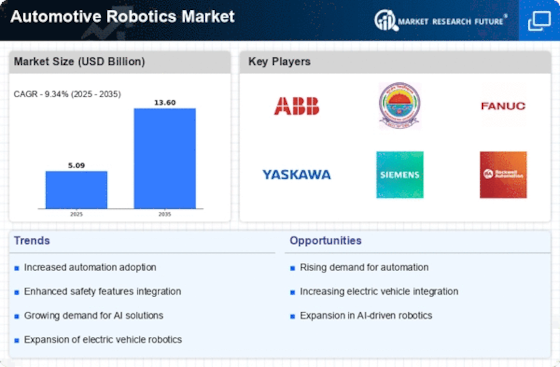Top Industry Leaders in the Automotive Robotics Market
*Disclaimer: List of key companies in no particular order
The automotive robotics market is a dynamic and rapidly evolving space, driven by technological advancements, increasing automation in manufacturing, and the shift towards electric vehicles (EVs). Key players in this market employ various strategies to gain an edge, and understanding these strategies is crucial for any company wanting to succeed in this domain.
Top Companies in the Automotive Robotics industry includes,
ABB Group
Comau SpA
Denso Wave Incorporated
Dürr AG
Fanuc Corporation
Harmonic Drive System
KUKA AG
Kawasaki Heavy Industries (Kawasaki Robotics)
Nabtesco Motion Control Inc
Nachi-Fujikoshi Corp, and others,
Key Player Strategies:
Industrial Automation Giants: Established players like ABB, Siemens, and Kuka Robotics leverage their extensive experience in industrial automation, strong global presence, and diverse product portfolios to maintain their market leadership. They focus on developing flexible and scalable robotic solutions for various automotive applications, such as welding, painting, and assembly.
Specialized Robotics Companies: Companies like Fanuc and Yaskawa Motoman specialize in robotics for specific automotive applications, offering high-precision robots and customized solutions. They often partner with automakers to develop tailored solutions that meet their specific needs.
Emerging Technology Startups: Startups and smaller players are disrupting the market with innovative robotics solutions like collaborative robots (cobots), AI-powered vision systems, and cloud-based robot management platforms. These companies cater to the growing demand for flexible and adaptable automation solutions, especially for smaller production facilities.
Factors for Market Share Analysis:
Product Portfolio Breadth: Offering a wide range of robots for various automotive applications, from material handling to final assembly, provides a competitive advantage. Companies with diverse product portfolios can cater to a wider range of customer needs.
Technological Innovation: Investing in R&D for next-generation robotics technologies like artificial intelligence, machine learning, and sensor fusion is crucial for staying ahead of the curve. Companies that develop cutting-edge solutions can attract premium customers and gain market share.
System Integration Capabilities: The ability to seamlessly integrate robots with existing production lines and software systems is essential for successful implementation. Companies with strong system integration expertise can offer turnkey solutions that are easier for automakers to adopt.
Scalability and Flexibility: Offering robots that can be easily scaled up or down and adapted to different production needs is becoming increasingly important, especially for smaller and medium-sized automakers. Companies that provide flexible solutions can cater to a wider range of customers.
New and Emerging Trends:
Collaborative Robots (Cobots): Cobots are safe and easy-to-use robots that can work alongside human workers, making them ideal for tasks like assembly and quality control. The demand for cobots is expected to grow significantly in the coming years.
AI-powered Robotics: Integrating AI into robots is enabling them to make decisions on their own, adapt to changing conditions, and learn from experience. This is leading to the development of more intelligent and autonomous robots that can perform complex tasks.
Cloud-based Robotics: Cloud-based platforms are enabling remote monitoring and management of robots, making it easier for companies to manage their robotic fleets and optimize their operations. This trend is expected to gain traction as companies look for ways to improve efficiency and reduce costs.
Focus on Sustainability: The automotive industry is increasingly focused on sustainability, and this is impacting the robotics market. Companies are developing robots that are more energy-efficient and made from recycled materials. Additionally, robots are being used to automate recycling processes in the automotive industry.
Overall Competitive Scenario:
The automotive robotics market is a highly competitive space with a diverse range of players. Established industrial automation giants are facing competition from specialized robotics companies and technology startups. The market is being driven by technological advancements, the increasing demand for automation, and the shift towards EVs. Companies that can develop innovative and adaptable robotic solutions, integrate new technologies like AI and cloud-based platforms, and focus on sustainability are well-positioned to succeed in this dynamic market.
Industry Developments and Latest Updates:
ABB Group:
- Date: December 14, 2023
- Source: ABB Robotics press release
- Update: ABB announced a partnership with Chinese electric vehicle (EV) manufacturer NIO to provide robotic welding and painting solutions for NIO's new production facility in Hefei, China.
Comau SpA:
- Date: December 20, 2023
- Source: Comau press release
- Update: Comau unveiled a new line of collaborative robots (cobots) specifically designed for the automotive industry. The robots are smaller and easier to program than traditional robots, making them ideal for tasks like assembly and material handling.
Denso Wave Incorporated:
- Date: November 28, 2023
- Source: Denso Wave website
- Update: Denso Wave launched a new software platform for its robots that simplifies programming and integration with other automation systems.
Dürr AG:
- Date: December 19, 2023
- Source: Dürr AG press release
- Update: Dürr announced a new strategic partnership with Siemens to develop and market integrated solutions for battery production in the automotive industry.
KUKA AG:
- Date: December 07, 2023
- Source: KUKA AG press release
- Update: KUKA announced a new partnership with Volkswagen to develop and implement AI-powered robots for the production of the ID. Buzz electric van.
Kawasaki Heavy Industries (Kawasaki Robotics):
- Date: November 29, 2023
- Source: Kawasaki Robotics website
- Update: Kawasaki Robotics launched a new line of six-axis robots with improved speed and accuracy, targeting applications in automotive painting and assembly.










